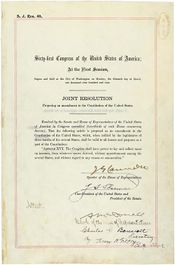Fifth Amendment
 From Conservapedia
From Conservapedia The Fifth Amendment to the United States Constitution states:
| “ | No person shall be held to answer for a capital, or otherwise infamous crime, unless on a presentment or indictment of a grand jury, except in cases arising in the land or naval forces, or in the militia, when in actual service in time of war or public danger; nor shall any person be subject for the same offense to be twice put in jeopardy of life or limb; nor shall be compelled in any criminal case to be a witness against himself, nor be deprived of life, liberty, or property, without due process of law; nor shall private property be taken for public use, without just compensation. | ” |
This amendment is typically associated with criminal trials where witnesses "plead the 5th" to invoke their right to avoid self-incrimination during questioning. It is erroneously believed by many that only guilty people would plead the 5th. In fact, this amendment was crafted in part to protect the innocent.[1]
Amendments to the Constitution of the United States of America Bill of Rights:
1 - Freedom of speech, press, religion, etc.
2 - Right to bear arms
3 - Quartering of soldiers
4 - Warrants
5 - Due process
6 - Right to a speedy trial
7 - Right by trial of a jury
8 - No cruel or unusual punishments
9 - Unenumerated rights
10 - Power to the people and states
11 - Immunity of states to foreign suits
12 - Revision of presidential election procedures
13 - Abolition of slavery
14 - Citizenship
15 - Racial suffrage
16 - Federal income tax
17 - Direct election of the United States Senate
18 - Prohibition of alcohol
19 - Women's suffrage
20 - Terms of the presidency
21 - Repeal of Eighteenth Amendment
22 - Limits the president to two terms
23 - District of Columbia Voting for President
24 - Prohibition of poll taxes
25 - Presidential disabilities
26 - Voting age lowered to 18
27 - Variance of congressional compensation
See also[edit]
- Privacy
- Police state
- Nanny State
- Eminent domain
- Martial law
- Militia
- Double jeopardy
- Oath Keepers
- Oath
- Oath for federal officials
- Oath for federal judges
References[edit]
- ↑ "[W]e have emphasized that one of the Fifth Amendment's "basic functions ... is to protect innocent men ... 'who otherwise might be ensnared by ambiguous circumstances.' " Grunewald v. United States, 353 U. S. 391, 421 (1957) (quoting Slochower v. Board of Higher Ed. of New York City, 350 U. S. 551, 557-558 (1956)) (emphasis in original). In Grunewald, we recognized that truthful responses of an innocent witness, as well as those of a wrongdoer, may provide the government with incriminating evidence from the speaker's own mouth. 353 U. S., at 421-422." OHIO v. MATTHEW REINER, No. 00-1028. Decided March 19, 2001. http://caselaw.lp.findlaw.com/cgi-bin/getcase.pl?court=US&navby=case&vol=000&invol=00-1028
External links[edit]
- What Fifth Amendment?, Pejman Yousefzadeh, RedState, Accessed March 27, 2014
- https://www.youtube.com/results?search_query=don't talk to police&sm=1
- https://www.youtube.com/watch?v=6wXkI4t7nuc - An law school professor and former criminal defense attorney tells you why you should never agree to be interviewed by the police
Categories: [Bill of Rights] [United States Constitution] [Fifth Amendment]
↧ Download as ZWI file | Last modified: 02/14/2023 03:21:23 | 112 views
☰ Source: https://www.conservapedia.com/Fifth_Amendment | License: CC BY-SA 3.0
 ZWI signed:
ZWI signed:
 KSF
KSF